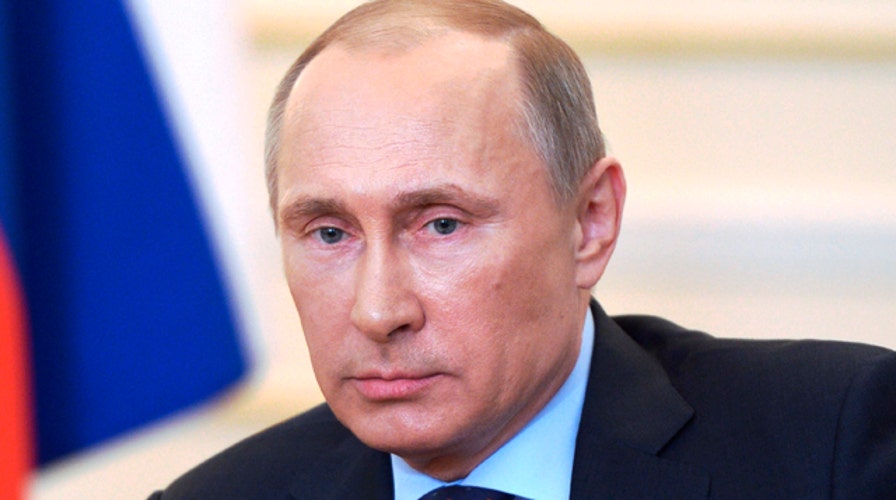KT McFarland: Russia eyeing Eastern Ukraine
Putin looking for excuse to move on natural resource-rich territory?
In ordering Russian troops deployed near the Ukrainian border back to their bases and stating that using military force in Ukraine would be “absolutely the last resort,” Russia’s president has signaled a temporary retreat to consolidate his territorial gains in the vital Crimea and impede American efforts to impose stiff diplomatic and economic sanctions against his own economically fragile country.
Appearing relaxed and confident, Putin beat his unacknowledged retreat at a press conference Tuesday with a small group of reporters in Moscow.
Backing away for now from a broader invasion of the largely pro-Russian eastern Ukraine, Putin nonetheless repeated his claim that the deposing of pro-Russian Viktor Yanukovych as Ukraine’s president, following his bloody suppression of demonstrations, and the Ukrainian parliament’s selection of a new government in Kiev, were an “anti-constitutional coup and the armed seizure of power.”
[pullquote]
Putin also refused to rule out a future use of force at some point to protect Ukraine’s ethnic Russian-speaking majority, the pretext he has repeatedly cited for sending an estimated 16,000 troops and special forces to seize the naval base in Crimea and other politically and militarily strategic locations in this region of 2 million people, 60 percent of whom are ethnic Russian.
Putin, however, was apparently unwilling at this stage to test President Obama’s determination to impose painful economic and diplomatic sanctions against Russia that would further diplomatically isolate Moscow and destabilize the ruble.
Monday, the Obama administration suspended military cooperation with Moscow and talks aimed at increasing trade and investment.
Obama reinforced his warning to make Putin’s occupation of Crimea a “costly proposition” for Russia by sending Secretary of State John Kerry to Kiev with a $1 billion plus package of loan guarantees and other assistance for the nearly bankrupt Ukrainian economy.
Obama’s ability to impose stiffer sanctions under consideration is dubious given the opposition of Germany, heavily dependent on Russian energy imports, and even the United Kingdom to stronger measures – such as asset freezes, visa bans, cancellation of the upcoming meeting in Sochi of the Group of 8 democracies and Russia’s expulsion from that elite club.
Obama has also apparently rejected a Republican proposal that he revisit previous decisions on the siting of missile defense installations in Eastern Europe, which the Kremlin has long opposed.
But Mr. Obama, who has been severely criticized not only by Republicans for failing to enforce other “red lines” he has drawn, seemed intent on matching action with rhetoric in this crisis. And for the moment at least, Putin seems unwilling to test Obama’s ability or determination to make good on his warnings.
The two leaders spoke by phone over the weekend for 90 minutes about the crisis, during which Obama warned there would be “dire consequences” for Russia should it try to expand its control of Ukraine, a country of 46 million, the largest former Soviet republic which has deep historic and economic links to Russia.
Russia’s currency went into free fall Monday, as fears of a broader war over Ukraine wiped out a tenth of the value of Moscow’s stock exchange. The Financial Times reported that investors fled Russian assets in droves, causing the largest daily fall since the 2008 financial crisis.
In Kiev, Ukrainian spokesman announced that Russian and Ukrainian officials had begun talks aimed at defusing the crisis.
Putin will undoubtedly try to use the time not only to consolidate his control of the naval base in Crimea, of vital strategic importance to Russia and for which it a long-term lease, but the rest of the peninsula.
He will also attempt to maximize Russian influence over Kiev and the rest of Ukraine, which under President Yanukovych was enormously sensitive to Russian concerns.
In Washington, Shawn Turner, the spokesperson for the Office of the Director of National Intelligence, denied media reports that the intelligence community had failed to anticipate Russia's invasion of Crimea.
The intelligence community, he said, had provided "timely and valuable" information that had "helped policy makers understand the situation and make informed decisions."
A CIA official, speaking on background, said that the Agency had specifically warned the White House about Russian troop movements near the border prior to Russia's stealthy occupation of the Crimea, noting that such movements were a source of concern because they would enable Russia to invade its neighbor quickly and with little warning.

